Though it was a challenging choice, the Angels made the correct one.
By opting not to trade two-way phenom Shohei Ohtani and instead shifting to “buyer” status, the Los Angeles Angels just altered the course of the upcoming trade deadline for both themselves and a number of other teams.
Ohtani’s impending free agency and his commitment to going through it put an end to weeks—no, months—of rumours that the Angels would try to trade him. Ultimately, the Angels made the right choice by refusing to deal the best and most well-liked baseball player in the world. Both strategies for handling the Ohtani dilemma are easily defendable, but team owners Arte Moreno and Perry Minasian made the right, albeit tough, decision by keeping Ohtani around for the rest of the 2023 season.
While not wholly unexpected, the Angels’ choice is dangerous, so before we applaud it, let’s address those risks. First off, by refusing to trade Ohtani, the Angels’ greatest option for making up for losing him to the market is a compensation draught pick obtained through the qualifying offer system. In trading, you can accomplish far more than that. In fact, there is reason to assume that the Angels would have obtained maybe three players, with tenures varying from prospects to major leaguers prior to arbitration, and future potential ranging from top-of-the-scale to “at least interesting,” had they successfully marketed Ohtani. Such a haul is not conceivable nowadays.
It must be noted that the Angels’ chances of making the postseason do not appear to be promising at first glance. The Angels’ chances of making the playoffs, according to the SportsLine Projection System, are at only 5.7%. By keeping Ohtani, the Angels are taking a chance despite the rather long odds.
Again, they have every right to do so. Clubs should go for it whenever it is feasible, which is a general team management principle that is no longer sufficient in today’s world. Unexpected results in October (and, tragically, November) are the norm in MLB’s postseason, which hums with turbulence and randomness that the six-month regular season normally subdues. The best teams don’t always win the championship, as we’ve seen time and time again, and wild-card teams frequently seem to hang around longer than they should. The goal is to make the playoff field so you can later assess how much luck is on your side. Baseball differs from the other major team sports in this regard since the postseason results in those sports are frequently more predictable.
There is also the recent past of the Angels to take into account, which amounts to a background of astonishing failure. The Angels are notorious for not having made the playoffs since 2014 and haven’t even achieved a winning season since 2015, despite having Trout at his legendary peak for many years and Ohtani at his solitary best in recent years. This example is one of the pantheon of wasted cores. The Angels should be fully dedicated to ending that perplexing drought, and you don’t accomplish that by trading away a superstar who doubles as your rotation ace and the best hitter in baseball on one roster spot. The Angels need this particular script to change so badly that keeping Ohtani even makes the odds worth testing at 5.7%.
Speaking of those odds, Minasian increased them by acquiring Reynaldo López to the bullpen and desperately needed rotation support in the form of Lucas Giolito. Additionally, Minasian could not be finished strengthening the roster by Tuesday. Additionally, the Halos anticipate finishing the season healthy and welcoming back a number of important players, most notably Trout. On those postseason odds, one should pick the over.
On another level, the Angels may have been dumping one of the most compelling personal stretch drives ever seen by moving Ohtani. Because of his unmatched excellence as a two-way player, we’ve grown accustomed to Ohtani’s regular meetings with history, but this season, the home runs are the focus. Ohtani currently holds a sizable lead in the majors with 39 home runs, as well as triples, slugging, total bases, OPS, and OPS+. He is now on track to hit 61 home runs.
You’ll notice that’s dangerously near to Aaron Judge’s recent American League record of 62 home runs, which he established. Even if the Angels fall out of contention in the upcoming weeks, Ohtani will continue to make crucial starts on the mound while approaching 50 and possibly even 60 home runs, which will drive traffic to the ballpark and attract viewers to television broadcasts. Allowing such a unique phenomena to occur, say, under the supervision of the Yankees, would be extremely destructive to the Angels club, which has already suffered a number of setbacks in recent years.
And finally, there’s the matter of Ohtani’s future. He has repeatedly stated that while deciding on his next workplace, he will give consideration to a team’s potential for success. The Angels haven’t demonstrated that yet. However, a strong postseason performance after keeping Ohtani, signing deadline additions to the roster, and restoring health to the core players can convince the incoming free agent that the company can provide him with everything he needs in this regard. That would increase the likelihood that the Angels could re-sign him after he hit the open market. Even though it still may not be Ohtani’s free agency’s most likely outcome, he is such a talent and draw that even small gains in the team’s standing matter a lot.
Above all, there is honour in taking a chance in baseball, even if success is uncertain. Beyond that, however, Ohtani himself and what he symbolises, is, and what the future might contain make the Angels’ strategy for dealing with him correct. Many of their recent choices can be attributed to the Angels, but not this one, if you so choose.
